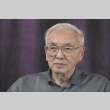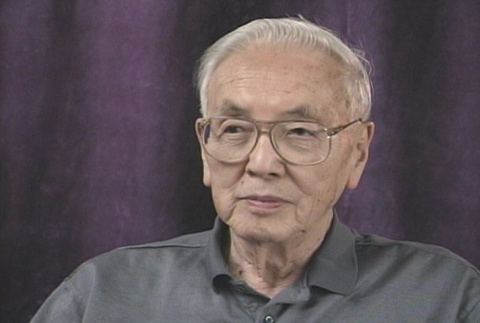307 items
307 items

vh
Bill Hosokawa Interview Segment 8 (ddr-densho-1000-129-8)
Getting married and moving to Singapore to work for an American-style newspaper

vh
Bill Hosokawa Interview Segment 23 (ddr-densho-1000-129-23)
Finding the positive in the mass removal: Japanese Americans were forced out of ethnic enclaves into wider society

vh
Bill Hosokawa Interview Segment 17 (ddr-densho-1000-129-17)
Role as editor of a camp newspaper, the Heart Mountain Sentinel

vh
Bill Hosokawa Interview Segment 24 (ddr-densho-1000-129-24)
Moving to Colorado and working for the Denver Post, covering the Korean and Vietnam wars

vh
Bill Hosokawa Interview Segment 9 (ddr-densho-1000-129-9)
Working in Shanghai, anticipating the onset of war between the United States and Japan, and returning to the U.S.

vh
Bill Hosokawa Interview Segment 13 (ddr-densho-1000-129-13)
Description of hostile sentiment toward Japanese Americans following the bombing of Pearl Harbor

vh
Bill Hosokawa Interview Segment 12 (ddr-densho-1000-129-12)
Role of the Emergency Defense Council after the bombing of Pearl Harbor

vh
Bill Hosokawa Interview Segment 28 (ddr-densho-1000-129-28)
Combating racism: deciding whether or not a situation warrants speaking out

vh
Bill Hosokawa Interview Segment 16 (ddr-densho-1000-129-16)
Thoughts on the resisters: admired their courage, but felt that "it wouldn't gain us anything"

vh
Bill Hosokawa Interview Segment 29 (ddr-densho-1000-129-29)
Finding government papers documenting that the move to Heart Mountain was ordered as punishment

vh
Bill Hosokawa Interview Segment 18 (ddr-densho-1000-129-18)
Dilemma faced as editor of the Heart Mountain Sentinel: report the truth without provoking negative sentiment and riots

vh
Bill Hosokawa Interview Segment 6 (ddr-densho-1000-129-6)
Facing discrimination while pursuing a career in journalism: told by a professor, "No American publisher is gonna ever hire you"

vh
Bill Hosokawa Interview Segment 10 (ddr-densho-1000-129-10)
Observations about the world climate shortly before the outbreak of World War II

vh
Bill Hosokawa Interview Segment 3 (ddr-densho-1000-129-3)
Father's activism in community groups; encouraged by parents to attend a Christian church

vh
Bill Hosokawa Interview Segment 2 (ddr-densho-1000-129-2)
Speaking English for the first time in grade school, exposure to other ethnicities

vh
Bill Hosokawa Interview Segment 27 (ddr-densho-1000-129-27)
Reaction to the outcomes of the coram nobis cases; thoughts on whether the incarceration could happen again: unlikely, but possible

vh
Bill Hosokawa Interview Segment 11 (ddr-densho-1000-129-11)
The bombing of Pearl Harbor: reaction of Japanese Americans, role of the media

vh
Bill Hosokawa Interview Segment 26 (ddr-densho-1000-129-26)
Initial opposition to "reparations": felt that "it cheapened our sacrifice," later changed to support "redress" and an apology

vh
Bill Hosokawa Interview Segment 25 (ddr-densho-1000-129-25)
Covering the civil rights movement: "no comparison" between the struggles of African Americans and Japanese Americans

vh
Bill Hosokawa Interview Segment 7 (ddr-densho-1000-129-7)
Involvement in the Japanese American Citizens League; Nisei identity as a member of white society

vh
Bill Hosokawa Interview Segment 5 (ddr-densho-1000-129-5)
Attending the University of Washington while working part-time for Jimmie Sakamoto and the Japanese American Courier

vh
Bill Hosokawa Interview Segment 20 (ddr-densho-1000-129-20)
Niseis' reaction to the so-called "loyalty questionnaire": "Mostly, it was a confusion that developed gradually into anger"; deciding to answer "yes-yes"

vh
Bill Hosokawa Interview Segment 4 (ddr-densho-1000-129-4)
Initial interest in journalism while attending Garfield High School

vh
Bill Hosokawa Interview Segment 22 (ddr-densho-1000-129-22)
Feelings about the resisters: have to understand the situation at the time
